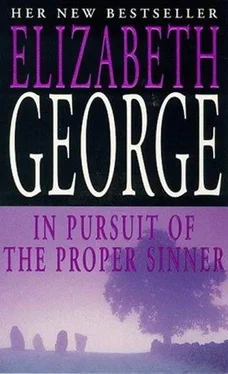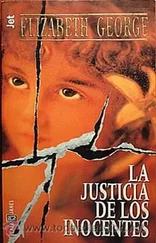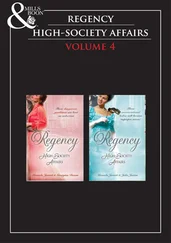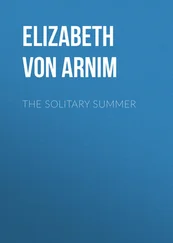Elizabeth George - In Pursuit of the Proper Sinner
Здесь есть возможность читать онлайн «Elizabeth George - In Pursuit of the Proper Sinner» весь текст электронной книги совершенно бесплатно (целиком полную версию без сокращений). В некоторых случаях можно слушать аудио, скачать через торрент в формате fb2 и присутствует краткое содержание. Жанр: Детектив, на английском языке. Описание произведения, (предисловие) а так же отзывы посетителей доступны на портале библиотеки ЛибКат.
- Название:In Pursuit of the Proper Sinner
- Автор:
- Жанр:
- Год:неизвестен
- ISBN:нет данных
- Рейтинг книги:4 / 5. Голосов: 1
-
Избранное:Добавить в избранное
- Отзывы:
-
Ваша оценка:
- 80
- 1
- 2
- 3
- 4
- 5
In Pursuit of the Proper Sinner: краткое содержание, описание и аннотация
Предлагаем к чтению аннотацию, описание, краткое содержание или предисловие (зависит от того, что написал сам автор книги «In Pursuit of the Proper Sinner»). Если вы не нашли необходимую информацию о книге — напишите в комментариях, мы постараемся отыскать её.
In Pursuit of the Proper Sinner — читать онлайн бесплатно полную книгу (весь текст) целиком
Ниже представлен текст книги, разбитый по страницам. Система сохранения места последней прочитанной страницы, позволяет с удобством читать онлайн бесплатно книгу «In Pursuit of the Proper Sinner», без необходимости каждый раз заново искать на чём Вы остановились. Поставьте закладку, и сможете в любой момент перейти на страницу, на которой закончили чтение.
Интервал:
Закладка:
They thanked him for the information and left him to continue his work with the harriers. Outside, it was Lynley who spoke first.
“Those times were written in pencil, Peter, the lot of them.”
“I noticed.” Hanken nodded in the direction of the manor house, saying, “Make quite a team, don't they? ‘Julie’ and his cousin.”
Lynley agreed. He just wondered what game the team was playing.
CHAPTER 8
Barbara Havers was relieved to be able to leave the claustrophobic confines of the Met headquarters. Once Winston Nkata requested that she get onto the Battersea address of Terry Cole, she wasted little time in dashing for her car. She took the most direct route possible, heading for the river, where she followed the Embankment to Albert Bridge. On the south bank of the Thames she consulted her battered A to Z until she found the street she was looking for sandwiched between the two Bridge Roads: Battersea and Albert.
Terry Cole's digs were in a forest-green brick-and-bay-windowed conversion set among other similar conversions in Anhalt Road. A line of buzzers indicated that there were four flats in the building, and Barbara pressed the one that had Cole/Thompson taped next to it. She waited, glancing round at the neighbourhood. Terraced houses, some in better condition than others, were fronted by gardens. Some were neatly planted, some were overgrown, and more than one appeared to be used as a dumping place for everything from rusting cookers to screenless televisions.
There was no answer from the flat. Barbara frowned and descended the steps. She blew out a breath, not wanting to face another few hours at the computer, and considered her options as she studied the house. A spate of breaking and entering definitely wasn't going to cut the mustard, and she was thinking about a retreat to the nearest pub for a heaped plate of bangers and mash, when she noticed a curtain flick in the bay window of the ground floor flat. She decided to have a go at the neighbours.
Next to flat number one was the name Baden. Barbara pressed the buzzer. A tremulous voice came through the speaker almost at once in reply, as if the person in the corresponding flat had been preparing for a visit from the law. Once Barbara identified herself-and cooperatively held up her warrant card so that it could be observed at a distance through the ground floor window-the lock on the door was released. She pushed it open and found herself inside a vestibule that was the approximate size of a chess board. It was chess board in decoration as well: red and black tiles across which innumerable footprints were smudged.
Flat number one opened to the right of the vestibule. When Barbara knocked, she found that she had to go through the procedure all over again. She held her warrant card to the peep hole in the door this time. When it had been studied to the occupant's satisfaction, two dead bolts and a safety chain were released and the door opened. Barbara was faced with an elderly woman who said apologetically, “One can't be too careful these days, I'm afraid.”
She introduced herself as Mrs. Geoffrey Baden and quickly brought Barbara up to speed on the particulars of her life without being asked. Twenty years a widow, she had no children, just her birds-finches, whose enormous cage occupied one complete side of the sitting room-and her music, the source of which seemed to be a piano that occupied the other side. This was an antique upright and its top held several dozen framed pictures of the late Geoffrey while its music rack displayed enough hand-scored sheet music to suggest that Mrs. Baden might be channelling Mozart in her free afternoons.
Mrs. Baden herself suffered from tremors. They affected her hands and her head, which shook subtly but unceasingly throughout her interview with Barbara.
“No place to sit in here, I'm afraid,” Mrs. Baden said cheerfully when she was done sharing her personal particulars. “Come through to the kitchen. I've a fresh lemon cake, if you'd like a piece.”
She would have loved a piece, Barbara told her. But the truth was that she was looking for Cilia Thompson. Did Mrs. Baden know where Cilia might be found?
“I expect she's working in the studio,” Mrs. Baden replied, confiding, “They're artists, the two of them. Cilia and Terry. Lovely young people, if you don't mind their appearance, which I myself never do. Times change, don't they? And one must change with them.”
She seemed such a gentle, kind soul that Barbara was reluctant to tell her of Terry's death immediately. So she said, “You must know the two of them well.”
“Cilia's rather shy. But Terry's a dear boy, always popping round with the little gift or surprise. He calls me his adopted Gran, does Terry. He sometimes does the odd job when I need him. And he always stops to ask if I want something from the grocery when he pops out for his shopping. Neighbours like that are hard to come by these days. Don't you agree?”
“I'm lucky that way myself,” Barbara said, warming to the old woman. “I've good neighbours as well.”
“Then count yourself among the fortunate, my dear. May I say what a lovely colour your eyes are, by the way? One doesn't see such a pretty blue that often. I expect you've some Scandinavian in your blood. Ancestrally, of course.”
Mrs. Baden plugged in the electric kettle and pulled a packet of tea from a cupboard shelf. She spooned leaves into a faded porcelain pot and brought two mismatched mugs to the kitchen table. Her tremors were so bad that Barbara couldn't imagine the woman wielding a kettle of boiling water, and a few minutes later, when the kettle clicked off, she hastened to make the tea herself. For this activity Mrs. Baden thanked her graciously. She said, “One keeps hearing that young people have become virtual savages these days, but that's not been my experience.” She used a wooden spoon to stir the tea leaves round in the water, then she looked up and said quietly, “I do hope dear Terry's not in some sort of trouble,” as if she'd expected the police to come calling for quite some time, despite her earlier words.
“I'm awfully sorry to tell you this, Mrs. Baden,” Barbara said, “but Terry's dead. He was murdered in Derbyshire several nights ago. That's why I'd like to talk to Cilia.”
Mrs. Baden mouthed the word dead in some confusion. Her expression became stunned as the full implication behind that word made its way past her defences against it. “Oh my goodness,” she said.
“That lovely young boy. But certainly you can't think that Cilia-or even that unfortunate boyfriend of hers-had anything to do with it.”
Barbara filed away the information about the unfortunate boyfriend for future reference. No, she told Mrs. Baden, she actually wanted Cilia to let her inside the flat. She needed a look round the place to see if there was anything that might give the police a clue why Terry Cole had been murdered. “He was one of two people killed, you see,” Barbara told her. “The other was a woman-Nicola Maiden, she was called-and it may well be that the killings happened because of her. But in any event, we're trying to establish whether Terry and the woman even knew each other.”
“Of course,” Mrs. Baden said. “I understand completely. You have a job to do, as unpleasant as it must certainly be.” She went on to tell Barbara that Cilia Thompson would be in the railway arches that fronted Portslade Road. That was where she, Terry, and two other artists pooled their resources to have a studio. Mrs. Baden couldn't give Barbara the exact address, but she didn't think the studio would be difficult to find. “One can always ask along the street in the other arches. I expect the proprietors would know whom you're talking about. As to the flat itself…” Mrs. Baden used a pair of silver tea tongs-their plate worn through in spots-to capture a sugar cube. It took her three tries because of the shaking, but she smiled with real pleasure when she managed it and she dropped the cube into her tea with a satisfied plop. “I do have a key, of course.”
Читать дальшеИнтервал:
Закладка:
Похожие книги на «In Pursuit of the Proper Sinner»
Представляем Вашему вниманию похожие книги на «In Pursuit of the Proper Sinner» списком для выбора. Мы отобрали схожую по названию и смыслу литературу в надежде предоставить читателям больше вариантов отыскать новые, интересные, ещё непрочитанные произведения.
Обсуждение, отзывы о книге «In Pursuit of the Proper Sinner» и просто собственные мнения читателей. Оставьте ваши комментарии, напишите, что Вы думаете о произведении, его смысле или главных героях. Укажите что конкретно понравилось, а что нет, и почему Вы так считаете.












